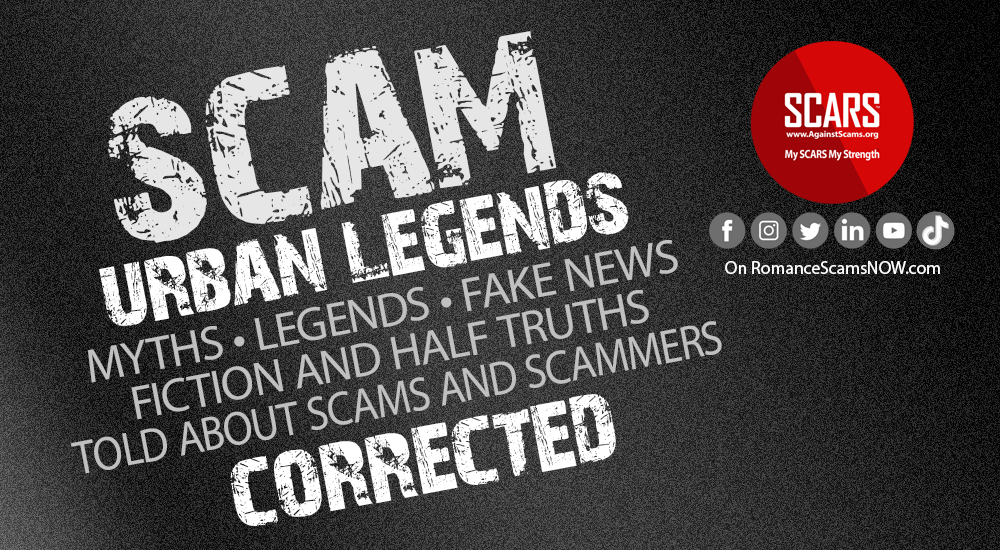Urban Legends Are Everywhere In The Scam Victim Communities!
They are spread by instant experts and other victims because they want to believe that they are true.
But sadly, most are not and many contribute to making victims more vulnerable.
Urban Legend: Being Strong-Willed Will Stop Future Scams! Wrong!
Victims frequently tell themselves and others that they will never be scammed again. And in fact, they somehow believe that if they were stronger-willed in the beginning they would not have been scammed in the first place.
All it takes to stop relationship scams is being strong-willed.
Essentially, while this is well-intentioned, it does several bad things.
- This is pure victim blaming – that somehow the victim was not strong enough so they were scammed
- By being stronger after the scam they will never let it happen again – without understanding the psychological manipulation techniques and changing behaviors every victim remains vulnerable
- This judges other victims as weaker than they are – they will never fall for this again because they are now stronger-willed
- This is more of the same fantastical thinking that got them in the first scam – by not recognizing the real causes of vulnerability and how to correct or overcome them these victims are doomed to repeat experiences.
- Only the combination of behavioral change and learning is going to stop or reduce the risk to scams.
When looked at through a more rational lens it becomes easy to see how bravado is contrary to avoiding scams in the future.
The best approach is humility, acceptance of what happened and the present situation, extending the effort to learn what this was and why this happened, and changing the fundamental risk-taking that led to this place in time.

Urban Legend: Anger & Aggression Will Teach Those Damn Scammers!
We see a constant stream of angry victims, so enraged by their experience that they spend their time raging against scammers on every anti-scam social media page they can find. Often they rage against us as we try to tell them the proper approach to post-scam actions.
Almost all scam victims will go through the anger phase as they are processing the grief from their experience – this is normal. Unfortunately, a full third of scam victims will become habitually angry – meaning that instead of processing grief they stay angry. It is easy to stay this way and become angry instead of processing grief or recovering from the trauma that these crimes cause. In fact, since trauma is caused less by the crime than a victim’s response to the crime, this anger only increases trauma and the difficulties that it will cause as time goes by.
So many victims have this “I know best” attitude after they end their scam, and this attitude leads to a constant stream of additional mistakes.
The truly unfortunate part of this anger is that it leads inevitably to increased trauma and despair long term. Instead of being able to hear rational voices early on when it really matters, angry victims may not listen for months or even years, some will never.
We mention this to help all victims understand that after the scam their choices determine not only what additional mistakes they will make but their entire future.
We are here to support victims, but that means helping them build their foundation after the scam based upon solid facts, not anger, We can’t help those that will not listen. But if you do listen and follow our recovery program, we can help get you back on the path to a happier life.
Urban Legend: “I’m Going To Do It My Way”
Many victims reject help and say they are going to recover on their own.
This is wonderful, but experience has taught us that this is yet another bad decision following the scam. Trauma does not simply go away, and ignorance is not overcome by remaining ignorant.
To effectively recover from the experience of a relationship scam requires learning, psychological and emotional support, and behavior changes. This is not opinion, this is fact based upon the evidence of working with nearly 8 million scam victims. It is also based upon the body of psychological science.
If you decide that you want to recover on your own, we wish you well and every success. But understand you are deciding to follow a path with a 90% failure rate. Victims do not have the knowledge or tools to make it through this on their own – in most cases.
However, there are multiple processes that can lead to a happy outcome. Therapy and counseling are pivotal in all of them and we encourage all victims to find local trauma counselors.
But if you really decide you know best and want to go it on your own, at least learn what is really going on so you do not lead other victims astray too!
Even If …
You think you know better and do not want to listen to us …
We recommend that you see a trauma counselor – if for no other reason than to get yourself evaluated.
Here are resources to help you find a trauma counselor or therapist:
To Learn More Also Look At Our Article Catalogs
Scam & Crime Types
More SCARS
- ScamsNOW Magazine – ScamsNOW.com
- ContraEstafas.org
- ScammerPhotos.com
- AnyScam.com – reporting
- AgainstScams.org – SCARS Corporate Website
- SCARS YouTube Video Channel











Leave A Comment